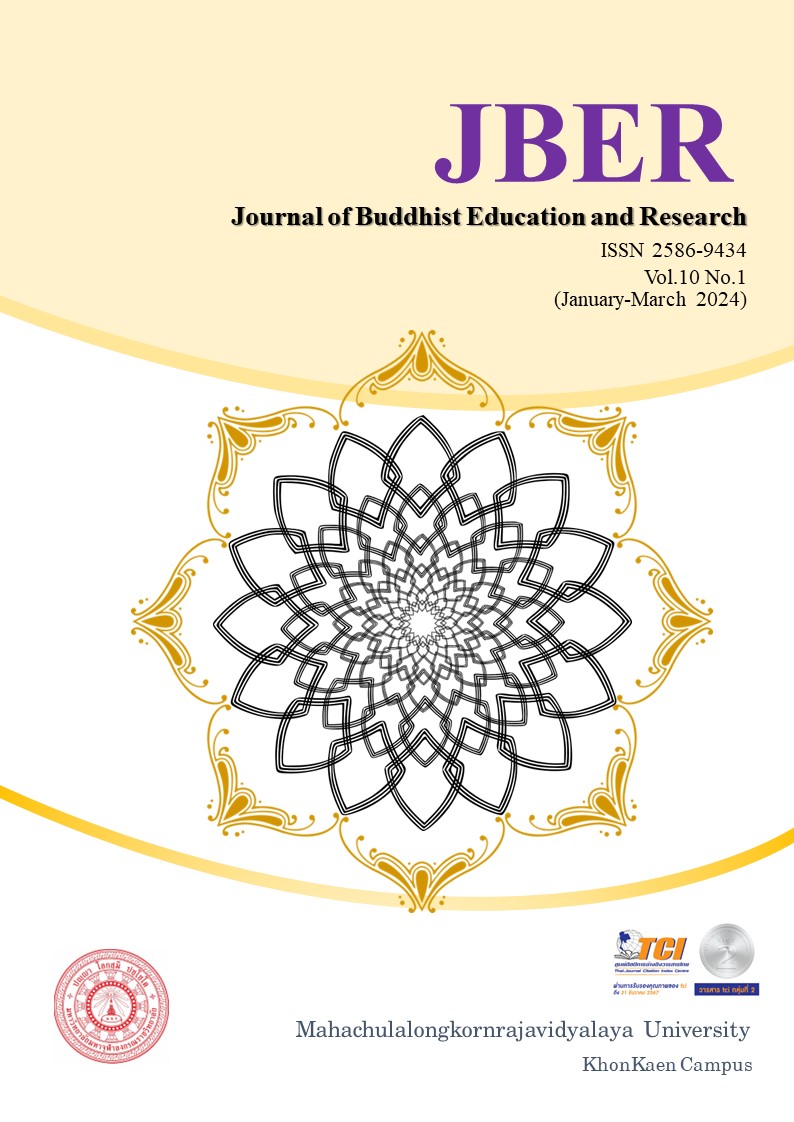ONLINE TEACHING MANAGEMENT SYSTEM FOR BASIC EDUCATION LEVELS OF GENERAL PRIVATE SCHOOLS UNDER THE OFFICE OF EDUCATION KHON KAEN PROVINCE
Keywords:
Keywords: Online teaching management systemAbstract
Abstract
This research article the objective is to develop an online teaching management system for basic education in general private schools. Under the jurisdiction of the Khon Kaen Provincial Education Office. How to conduct research It consists of the study of concepts, principles, theories and related research. The researcher asked experts for opinions. Teaching system design and educational technology in the field of design and development of educational media and computers, 20 people were purposively selected. By inquiring using the Delphi technique for 3 rounds, expert opinions with a median equal to or greater than 3.50 and an interconal range equal to or less than 1.50 were used to develop an online teaching management system for basic education levels. General private school Under the jurisdiction of the Khon Kaen Provincial Education Office. The teaching management system developed has been certified by 5 experts. Statistics used in the research include frequency, percentage, arithmetic, standard deviation, mean, median and interconal range.
The results of the research found that the online teaching management system for the basic education level of private schools, general category, under the Khon Kaen Provincial Education Office It consists of the following details:
- Online teaching planning consists of 1) philosophy, aspirations, policies, principles 2) Problems in organizing teaching and learning 3) Curriculum 4) Student needs 5) Infrastructure
- Designing online teaching consists of 1) determining teaching objectives, 2) analyzing students, 3) analyzing teaching content, 4) determining learning methods and teaching activities, 5) determining teaching media and infrastructure, and 6) Set management methods
- Producing online teaching kits consists of 1) planning the production of teaching kits, 2) choosing the type of lesson program, 3) preparing to produce the teaching kits, 4) producing the teaching kits, 5) testing the effectiveness of the teaching kits, and 6) packaging the teaching kits. Teach how to choose channels
- The system for conducting online teaching and evaluating learning achievement consists of 1) testing before class, 2) teaching, 3) controlling and checking. Follow up on academic results 4) Test after class
- There are also other important aspects, namely suitability, budget, impacts, problems and obstacles.
References
เอกสารอ้างอิง
จิราภรณ์ ผันสว่าง. (2559). ความเป็นมืออาชีพของผู้บริหารสถานศึกษา (Professional Education
Administration: Basic Qualifications, Skills, and Vision). วารสารมหาวิทยาลัยมหามกุฏ
ราชวิทยาลัย วิทยาเขตร้อยเอ็ด, 5(2) : 247-254.
วรวิทย์ บุญญาธิพิทักษ, จิราภรณ์ ผันสว่าง, พระครูชัยรัตนากร. (2565). การบริหารงานวิชาการแบบมี
ส่วนร่วมตามหลักสังคหวัตถุ 4 ของคณะกรรมการสถานศึกษาขั้นพื้นฐาน โรงเรียนขยายโอกาส
ทางการศึกษา อําเภอปทุมรัตน์ จังหวัดร้อยเอ็ด. วารสารพุทธปรัชญาวิวัฒน์, 6(2) : 477-491.
รำจวน เบญจศิริ.(2564).ความผูกพันในการเรียนออนไลน์ของนักการศึกษา : กรณีศึกษา
มหาวิทยาลัยรามคำแหง.วารสารการเมืองการบริหารและกฏหมายปีที่ 44 ฉบับที่ 1. คณะรัฐศาสตร์และนิติศาสตร์มหาวิทยาลัยบูรพา.
ณิชกานต์ แก้วจันทร์.(2564).ความพร้อมในการจัดการเรียนการสอนและความคาดหวังประสิทธิผล
การศึกษาในระบบการเรียนการสอนออนไลน์ในทรรศนะของนักศึกษา.คณะวิทยาการจัดการ มหาวิทยาลัยศิลปากรหลักสูตรบริหารธุรกิจบัณฑิต สาขาวิชาการจัดการธุรกิจทั่วไปคณะวิทยาการจัดการ มหาวิทยาลัยศิลปากร.
ธนะวัฒน์ วรรณประภา.(2562).การจัดสภาพแวดล้อมการเรียนรู้ออนไลน์กับการศึกษาในศตวรรษ
ที่ 21 .วารสาร e-joural of Education Studies. มหาวิทยาลัยบูรพา.
นิตยา มณีวงศ์.(2564).ศึกษาพฤติกรรมและปัจจัยความสำเร็จการเรียนออนไลน์แอปพลิเคชั่นไลน์
ในช่วงวิกฤตCovid 19 . วารสารครุศาสตร์สาร.ปีที่ 15 (ฉบับที่ 1) เดือนมกราคม-มิถุนายน
นุชรินทร์ ทองกันทม.(2563).ผลการจัดการเรียนการสอนออนไลน์ผ่าน Application Zoom โดย
ใช้บทบาทสมมุติและผลประกอบที่มีต่อผลสัมฤทธิ์ทางการเรียนวิชาสุขศึกษาของนักเรียน
ที่ไม่ผ่านเกณฑ์คะแนน สอบก่อนเรียน.หลักสูตรครูศาสตรมหาบัณฑิต สาขาพลศึกษา มหาวิทยาลัยราชภัฏจันเกษม.
ประสูติ เดชสุวรรณ .(2542).การพัฒนาและผลลัพธ์การสอนเสริมส่วนปฏิบัติการแบบออนไลน์ใน
รายวิชาวิเคราะห์โครงข่ายไฟฟ้าเพื่อให้เกิดผลสัมฤทธิ์ในการเรียน.วารสาร Engineering
Transactions.vol.23.No.1(49) มกราคม 2562.
วันเฉลิม ปิ่นแก้ว.(2564).ผลกระทบจากการเรียนออนไลน์ของนักการศึกษามหาวิทยาลัยราชภัฏ
บุรีรัมย์.กลุ่มวิชาทดสอบและวิจับทางการศึกษา คณะครุศาสตร มหาวิทยาลัยราชภัฏบุรีรัมย์.
วิทัศน์ ผัดเจริญผล.(2563). ความพร้อมในการจัดการเรียนการการสอนออนไลน์ภายใต้
สถานการณ์ระบาดไวรัส Covid-19.วารสารศาสตรการศึกษาและพัฒนามนุษย์ปีที่ 4 ฉบับที่ 1 เดือนมกราคม-มิถุนายน 2563.
ศรัณยา สงวนวงศ์.(2564).ประสิทธิภาพของการเรียนออนไลน์ในยุคโควิด 19 ของนักเรียนชั้น
มัธยมศึกษาในเขตพื้นที่กรุงเทพมหานคร.สาขาการจัดการ คณะบริหารธุรกิจ มหาวิทยาลัย
รามคำแหง.
สุมิตร สุวรรณ.(2563). ความพร้อมในการจัดการเรียนการสอนออนไลน์วารสารศาสตร์
การศึกษา.vol 4 No.1 มกราคม-มิถุนายน 2563. คณะศึกษาศาสตร์และพัฒนศาสตร์
มหาวิทยาลัยเกษตรศาสตร์วิทยาลัยเขตคำแพงแสน ศูนย์วิจัยและพัฒนาการศึกษา
สุพจน์ อิงอาจ.(2564).การจัดการเรียนการสอนออนไลน์ที่ส่งผลต่อการตั้งใจอย่างต่อเนื่องต่อการ
เรียนในแบบฐานวิถีชีวิตใหม่ของนักศึกษาระดับปริญญาตรี.วารสารบริหารธุรกิจ
เทคโนโลยีมหานคร.ปีที่ 18 ฉบับที่ 1 มกราคม-มิถุนายน 2564
เอกราช โฆษิตพิมานเวช.(2561). เทคโนโลยีสารสนเทศของโรงเรียนเอกชนในยุคไทยแลนค์ 4.1
.วารสารการบริหารสถานศึกษาและภาวะผู้นำ,6(23):14-23.





